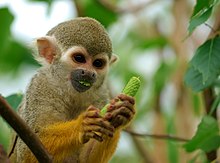Squirrel monkey
| Squirrel monkeys Temporal range: to recent |
|
|---|---|
 |
|
| Common squirrel monkey | |
| Scientific classification | |
| Kingdom: | Animalia |
| Phylum: | Chordata |
| Class: | Mammalia |
| Order: | Primates |
| Family: | Cebidae |
| Subfamily: |
Saimiriinae Miller, 1912 (1900) |
| Genus: |
Saimiri Voigt, 1831 |
| Type species | |
|
Saimiri sciureus Linnaeus, 1758 |
|
| Species | |
Squirrel monkeys are New World monkeys of the genus Saimiri. They are the only genus in the subfamily Saimirinae. The name of the genus is of Tupi origin (sai-mirim or gai-mbirin < sai 'monkey' and mirim 'small'), and was also used as an English name by early researchers.
Squirrel monkeys live in the tropical forests of Central and South America in the canopy layer. Most species have parapatric or allopatric ranges in the Amazon, while S. oerstedii is found disjunctly in Costa Rica and Panama.
The common squirrel monkey is captured for the pet trade and for medical research but it is not threatened. Two squirrel monkey species are threatened: the Central American squirrel monkey and the black squirrel monkey are listed as vulnerable by the IUCN.
Until 1984, all South American squirrel monkeys were generally considered part of a single widespread species, and many zoologists considered the Central American squirrel monkey to be a member of that single species as well. The two main groups currently recognized can be separated by the white above the eyes; it is shaped as a Gothic ("pointed") Arch in the S. sciureus group, while it is shaped as a Roman ("rounded") Arch in the S. boliviensis group.
The crown lineage of the extant squirrel monkeys appears to have diverged around 1.5 million years ago.S. boliviensis appears to be the first diverging species in the group. S. oerstedii and S. s. sciureus, are sister species. S. s. macrodon is the sister species to the S. oerstedii / S. s. sciureus clade.
...
Wikipedia
